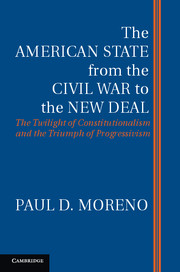 The American State from the Civil War to the New Deal
The American State from the Civil War to the New Deal Book contents
- Frontmatter
- Contents
- Abbreviations Used in the Footnotes
- Acknowledgments
- Introduction
- Part I The Old Regime
- Part II Early Progressivism
- 4 The New Jurisprudence
- 5 The Due Process Dialectic
- 6 Toward a Federal Police Power
- 7 Rooseveltian Progressivism
- 8 The Lochner Incident
- 9 Court and Constitution in Crisis
- 10 Taft and the Republican Crackup
- Part III Late Progressivism
- Part IV The New Deal
- Appendix A
- Appendix B
- Primary Sources
- Index
- References
6 - Toward a Federal Police Power
Published online by Cambridge University Press: 05 May 2013
- Frontmatter
- Contents
- Abbreviations Used in the Footnotes
- Acknowledgments
- Introduction
- Part I The Old Regime
- Part II Early Progressivism
- 4 The New Jurisprudence
- 5 The Due Process Dialectic
- 6 Toward a Federal Police Power
- 7 Rooseveltian Progressivism
- 8 The Lochner Incident
- 9 Court and Constitution in Crisis
- 10 Taft and the Republican Crackup
- Part III Late Progressivism
- Part IV The New Deal
- Appendix A
- Appendix B
- Primary Sources
- Index
- References
Summary
THE COMMERCE POWER AND ANTITRUST
Congress and the president began to respond to calls for reform in industrial policy after the crisis of the 1890s, and the Supreme Court gradually expanded federal regulatory power under the Sherman Act after the 1895 sugar trust decision. In 1899 it held that a price-fixing scheme among pipe manufacturers in several states fell within Congress’ power to regulate interstate commerce. Such “loose” or cartel combinations were more vulnerable than the “tight” or holding company trusts such as American Sugar. In two railroad cases, the Court read the Sherman Act’s prohibition of “every” contract in restraint of trade literally – to prohibit pooling arrangements among railroads. Ironically, the Sherman Act could most effectively assail a “natural monopoly” such as railroads, where competition was impossible. Perhaps the most important extension of the federal government’s commerce power came in 1905, when the Court held that the various operations of a meatpacking company, while separately local and non-commercial, constituted a “stream of commerce” that could be regulated. The Court had begun to shift its analysis from the type of activity (manufacturing versus commerce) to its impact on commerce. Finally, in 1911 the Court took a step back and adopted the “rule of reason,” holding that not “every” combination, but only unreasonable combinations – for the most part, those with no public or consumer benefit – ran afoul of the Sherman Act. While the intensity of the Act abated (from “every combination” to “unreasonable” ones), its scope expanded.
- Type
- Chapter
- Information
- The American State from the Civil War to the New DealThe Twilight of Constitutionalism and the Triumph of Progressivism, pp. 70 - 85Publisher: Cambridge University PressPrint publication year: 2013


